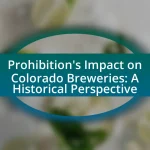The article focuses on the pioneering breweries in Colorado, specifically Boulder Beer Company and Wynkoop Brewing Company, which played a crucial role in the state’s craft beer movement. Established in 1979 and 1988 respectively, these breweries introduced innovative brewing techniques and unique flavor profiles that challenged mass-produced beers, contributing to the growth of over 400 breweries in Colorado by 2023. The article explores their impact on local communities, the challenges they faced, and the regulatory landscape that shaped their establishment, as well as the legacies they left in terms of quality, community engagement, and the evolution of consumer preferences in the craft beer industry. Additionally, it highlights best practices for aspiring brewers based on the successes of these early establishments.

What are the pioneering breweries in Colorado?
The pioneering breweries in Colorado include Boulder Beer Company, established in 1979, and Wynkoop Brewing Company, founded in 1988. Boulder Beer Company is recognized as Colorado’s first craft brewery, while Wynkoop Brewing Company, co-founded by former Denver mayor John Hickenlooper, played a significant role in the craft beer movement in the state. These breweries helped lay the foundation for Colorado’s vibrant craft beer culture, which has grown to include over 400 breweries as of 2023.
How did these breweries contribute to the craft beer movement?
These breweries contributed to the craft beer movement by introducing innovative brewing techniques and unique flavor profiles that challenged the dominance of mass-produced beers. For instance, they utilized local ingredients and traditional brewing methods, which not only enhanced the quality of beer but also fostered a sense of community and local identity. The establishment of these breweries in Colorado during the 1980s and 1990s played a crucial role in the growth of the craft beer industry, as they inspired a new generation of brewers to experiment and push the boundaries of beer styles. Their success demonstrated the viability of craft brewing, leading to a significant increase in the number of microbreweries and brewpubs across the United States, ultimately shaping the craft beer landscape we see today.
What unique brewing techniques did they introduce?
The pioneering breweries in Colorado introduced unique brewing techniques such as dry hopping and the use of local ingredients. Dry hopping, which involves adding hops during fermentation rather than during the boil, enhances aroma and flavor without increasing bitterness. Additionally, these breweries emphasized the use of locally sourced grains and hops, which not only supported local agriculture but also created distinct flavor profiles that reflected the region’s terroir. This approach contributed to the craft beer movement by promoting innovation and quality in brewing practices.
How did their business models differ from traditional breweries?
Pioneering breweries in Colorado differed from traditional breweries primarily by focusing on small-scale production and unique, innovative beer styles. Unlike traditional breweries that often emphasized mass production and standardized flavors, these craft establishments prioritized quality, creativity, and local ingredients, which allowed them to cater to niche markets and foster community engagement. For instance, many of these breweries adopted direct-to-consumer sales models, such as taprooms and brewpubs, which enabled them to build strong relationships with customers and offer a diverse range of seasonal and experimental brews. This approach not only differentiated them from larger, industrial breweries but also contributed to the growth of the craft beer movement in the region.
Why is Colorado significant in the craft beer landscape?
Colorado is significant in the craft beer landscape due to its early adoption and promotion of craft brewing, which began in the late 1970s. The state is home to pioneering breweries such as Boulder Beer Company, established in 1979, which is recognized as one of the first craft breweries in the United States. Additionally, Colorado hosts the Great American Beer Festival, the largest beer festival in the country, showcasing thousands of craft beers and attracting brewers and enthusiasts from across the nation. This combination of historical significance and ongoing innovation has solidified Colorado’s reputation as a leader in the craft beer movement.
What historical factors influenced the growth of craft breweries in Colorado?
The growth of craft breweries in Colorado was significantly influenced by the state’s liberal alcohol laws and the rise of the craft beer movement in the 1980s. Colorado’s legalization of brewpubs in 1988 allowed for the establishment of small-scale breweries, fostering a culture of local brewing. By 1990, Colorado had 25 craft breweries, a number that grew rapidly as consumers sought unique, locally-produced beers. Additionally, the state’s access to high-quality water sources and a strong agricultural base for hops and barley contributed to the development of a vibrant craft beer industry. These factors combined created an environment conducive to the flourishing of craft breweries in Colorado.
How has the state’s culture impacted its brewing industry?
The state’s culture has significantly influenced its brewing industry by fostering a strong community-oriented approach and an appreciation for local ingredients. Colorado’s culture, characterized by outdoor recreation and a focus on sustainability, has led to the establishment of numerous craft breweries that prioritize environmental responsibility and local sourcing. For instance, the Colorado Brewers Guild reports that over 400 craft breweries operate in the state, many of which emphasize community engagement through events and collaborations. This cultural emphasis on localism and quality has positioned Colorado as a leader in the craft beer movement, with the state hosting the Great American Beer Festival, which showcases the importance of craft brewing in its cultural identity.

What challenges did the first craft breweries in Colorado face?
The first craft breweries in Colorado faced significant challenges including regulatory hurdles, limited access to distribution channels, and competition from established beer brands. Regulatory hurdles stemmed from complex state and local laws governing alcohol production and sales, which made it difficult for new breweries to navigate the licensing process. Limited access to distribution channels restricted their ability to reach consumers, as established distributors often favored larger, well-known brands. Additionally, competition from established beer brands posed a challenge, as these brands dominated the market and had established consumer loyalty, making it difficult for new entrants to gain market share.
How did regulatory issues affect their establishment?
Regulatory issues significantly hindered the establishment of pioneering breweries in Colorado. The introduction of stringent licensing requirements and zoning laws created barriers for new entrants in the craft beer market. For instance, the Colorado Liquor Code, which was enacted in the 1930s, imposed strict regulations on alcohol production and distribution, limiting the ability of small breweries to operate. Additionally, the need for compliance with health and safety standards further complicated the establishment process, often resulting in delays and increased costs for aspiring brewers. These regulatory challenges ultimately shaped the landscape of the craft beer industry in Colorado, influencing the number and diversity of breweries that could successfully launch during that period.
What specific laws impacted the brewing industry in Colorado?
The specific laws that impacted the brewing industry in Colorado include the legalization of craft brewing through the Colorado Craft Beer Act of 2010, which allowed breweries to sell beer directly to consumers and expanded the definition of a brewery. Additionally, the repeal of Prohibition in 1933 and the subsequent establishment of the Colorado Liquor Code laid the groundwork for the modern brewing landscape. These laws facilitated the growth of craft breweries, contributing to Colorado’s reputation as a leading state in craft beer production, with over 400 breweries operating as of 2023.
How did these breweries navigate the licensing process?
These breweries navigated the licensing process by thoroughly understanding and complying with local, state, and federal regulations. They often engaged legal experts to assist with the complex requirements, which included obtaining necessary permits, adhering to zoning laws, and ensuring health and safety standards were met. For instance, the Colorado Department of Revenue’s Liquor Enforcement Division outlines specific steps for obtaining a brewery license, which these establishments followed meticulously to avoid delays and legal issues.
What financial hurdles did these breweries encounter?
The breweries in Colorado faced significant financial hurdles, primarily due to high startup costs and competition from established beer brands. These pioneering establishments often struggled with securing funding, as traditional banks were hesitant to invest in the craft beer sector, which was relatively new and unproven at the time. Additionally, the breweries encountered challenges related to regulatory compliance, which required substantial financial resources for licensing and permits. According to the Brewers Association, many small breweries reported that initial capital investments could exceed $1 million, making it difficult to achieve profitability in the early years.
How did they secure funding in the early days?
In the early days, pioneering breweries in Colorado secured funding primarily through personal savings and loans from family and friends. Many founders invested their own capital, often supplemented by small loans, to cover initial startup costs such as equipment and ingredients. For instance, the establishment of the first craft breweries often involved tapping into local networks for financial support, reflecting a community-driven approach to funding. This grassroots method of financing was crucial in an era when traditional bank loans for new breweries were hard to obtain due to perceived risks in the craft beer market.
What strategies did they use to remain profitable?
Pioneering breweries in Colorado remained profitable by diversifying their product offerings and establishing strong community ties. They introduced a variety of beer styles to attract different consumer preferences, which helped to expand their customer base. Additionally, these breweries often engaged in local events and collaborations, fostering a loyal community following. For instance, many of them participated in local festivals and partnered with nearby businesses, which not only increased visibility but also drove sales. This strategic focus on community engagement and product diversity contributed significantly to their financial sustainability.
What are the legacies of Colorado’s first craft breweries?
The legacies of Colorado’s first craft breweries include the establishment of a vibrant craft beer culture, the promotion of local ingredients, and the influence on national brewing trends. These breweries, such as Boulder Beer Company founded in 1979, paved the way for a diverse range of beer styles and fostered community engagement through local events and festivals. Their commitment to quality and innovation has inspired countless new breweries, contributing to Colorado’s reputation as a craft beer hub, with the state ranking among the top in the nation for craft breweries per capita.
How have these breweries influenced modern craft brewing?
Pioneering breweries in Colorado have significantly influenced modern craft brewing by establishing foundational practices and styles that are now widely adopted. These breweries, such as Boulder Beer Company and Wynkoop Brewing Company, were among the first to embrace innovative brewing techniques and diverse flavor profiles, setting a precedent for quality and creativity in the craft beer industry. Their commitment to using local ingredients and experimenting with various beer styles has inspired countless new breweries to prioritize authenticity and regional character in their offerings. Additionally, these early establishments played a crucial role in fostering a community-oriented approach, encouraging collaboration among brewers and promoting craft beer culture, which has become a hallmark of the modern craft brewing movement.
What trends can be traced back to their innovations?
The trends that can be traced back to the innovations of pioneering breweries in Colorado include the rise of craft beer culture, the emphasis on local ingredients, and the development of unique brewing styles. These breweries, such as Boulder Beer Company and Wynkoop Brewing Company, introduced innovative brewing techniques and flavors that differentiated them from mass-produced beers. Their focus on quality and creativity led to a significant increase in consumer interest in craft beers, which, according to the Brewers Association, saw a growth from 1,500 craft breweries in 2000 to over 8,000 by 2019. This shift not only transformed the beer market but also encouraged a broader movement towards artisanal and locally sourced products across various food and beverage sectors.
How have they shaped consumer preferences in beer?
Pioneering breweries in Colorado have significantly shaped consumer preferences in beer by introducing innovative brewing techniques and diverse flavor profiles. These establishments, such as Boulder Beer Company and Wynkoop Brewing Company, led the craft beer movement in the 1980s and 1990s, emphasizing quality ingredients and unique recipes. Their focus on local sourcing and community engagement has fostered a preference for craft beers over mass-produced options, as evidenced by the rise in craft beer sales, which accounted for 23.1% of the U.S. beer market share in 2020, according to the Brewers Association. This shift reflects a growing consumer demand for authenticity and variety in beer choices.
What role do these pioneering breweries play in local communities?
Pioneering breweries play a crucial role in local communities by fostering economic growth and enhancing social cohesion. These establishments create jobs, stimulate local economies through tourism, and support local agriculture by sourcing ingredients from nearby farms. For instance, a study by the Brewers Association indicates that craft breweries contribute over $82 billion to the U.S. economy, demonstrating their significant impact. Additionally, these breweries often serve as community hubs, hosting events and gatherings that strengthen local ties and promote cultural exchange.
How do they contribute to local economies?
Pioneering breweries contribute to local economies by generating jobs, stimulating tourism, and fostering community engagement. These establishments create employment opportunities in brewing, hospitality, and retail sectors, which can lead to a significant economic impact; for instance, the Colorado craft beer industry employed over 10,000 people and contributed approximately $1.1 billion to the state’s economy in 2020. Additionally, breweries attract tourists, with craft beer tourism becoming a vital part of local economies, as visitors often spend on accommodations, dining, and local attractions. Furthermore, these breweries often engage in community events and partnerships, enhancing local culture and supporting other local businesses, thereby reinforcing economic ties within the community.
What community engagement initiatives have they undertaken?
The pioneering breweries in Colorado have undertaken various community engagement initiatives, including hosting local events, collaborating with non-profit organizations, and supporting local farmers. For instance, many breweries organize community festivals that celebrate local culture and craft beer, fostering a sense of community among residents. Additionally, partnerships with non-profits often involve fundraising events where a portion of sales is donated to local causes, demonstrating their commitment to social responsibility. Furthermore, several breweries source ingredients from local farmers, which not only supports the local economy but also promotes sustainability within the community.
What can aspiring brewers learn from Colorado’s pioneering breweries?
Aspiring brewers can learn the importance of innovation and community engagement from Colorado’s pioneering breweries. These establishments, such as Boulder Beer Company and Wynkoop Brewing Company, were among the first to embrace craft brewing in the 1980s, emphasizing unique flavors and local ingredients. Their success demonstrates that focusing on quality and creativity can differentiate a brewery in a competitive market. Additionally, these breweries fostered strong community ties, often collaborating with local businesses and participating in regional events, which helped build a loyal customer base and promote the craft beer culture. This approach highlights the significance of community involvement and brand identity in establishing a successful brewing business.
What best practices should new breweries adopt?
New breweries should adopt best practices such as maintaining high-quality ingredients, implementing strict sanitation protocols, and focusing on customer engagement. High-quality ingredients ensure the production of superior beer, which is essential for building a loyal customer base. Strict sanitation protocols prevent contamination and spoilage, which are critical for maintaining product integrity and safety. Additionally, engaging with customers through tastings, events, and social media fosters community relationships and brand loyalty. These practices are supported by industry standards and successful case studies from established breweries, demonstrating their effectiveness in promoting growth and sustainability in the craft beer market.
How can they effectively market their products in a competitive landscape?
To effectively market their products in a competitive landscape, pioneering breweries in Colorado should leverage unique branding and storytelling that highlights their heritage and craftsmanship. By emphasizing their local roots and the quality of their ingredients, these breweries can differentiate themselves from larger competitors. For instance, breweries like Boulder Beer Company have successfully used their history and commitment to quality to build a loyal customer base. Additionally, engaging with the community through events, collaborations, and social media can enhance visibility and foster customer loyalty, as seen with the success of local beer festivals that attract significant crowds and media attention.


